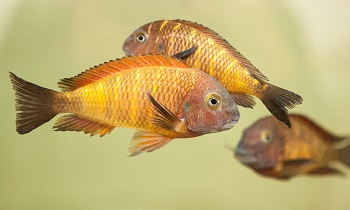Humans aren’t the only species whose mental state is affected when they lose their lover, according to Daily Mail.
Female cichlids, a type of monogamous fish that primarily dwells in South America, become depressed and lovesick when their mate is removed and they’re placed with a non-preferred male partner, a new study has found.
Researchers came to this conclusion after the female fish took longer to investigate boxes that either contained food or were empty, demonstrating symptoms of apathy.
The study, was conducted by researchers from the University of Burgundy in Dijon, France.
It’s also believed to be the first study that shows non-human species can also form attachments to sexual partners.
‘It is, as far as we know, the very first demonstration of emotional bonds between partners in non-human species,’ Francois-Xavier Dechaume-Moncharmont, one of the study’s co-authors said.
In order to prove this hypothesis, the researchers carried out a series of cognitive tests in a group of 33 female cichlids.
Over the course of two weeks, they closely studied how the female fish behaviors changed when they were paired with a male fish that they had not picked themselves.
When females were paired up with a male fish they preferred, they spawned faster, tended to their eggs and were more likely to look at their environment with a ‘glass half-full’ perspective.
By contrast, a female fish who was paired with an non-preferred male fish was less likely to spawn.
Scientists then gauged the female fishes’ mood further with another round of experiments.
They placed two different types of containers in the fishtank: Ones with a black lid that were empty and another with a white lid that contained a treat.
Over time, the fish were meant to learn through trial and error which containers held a treat and which ones did not.
Researchers found that females who were paired with the male they rejected either paused when investigating the containers, or didn’t investigate them at all.
This asserts that females who are torn away from their true love are more likely to take on a ‘pessimistic bias,’ or depressed outlook.
Meanwhile, their female counterparts who remained with their chosen male discovered the white containers more quickly, demonstrating again that glass half-full perspective.
‘When we are removing the partner from the female, she is exhibiting pessimistic behavior,’ Dechaume-Moncharmont said.
‘We have shown in this study that in the sexual context, the presence or absence of the partner may affect the emotion of the female.’
N.H.Kh

